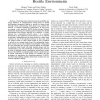Free Online Productivity Tools
i2Speak
i2Symbol
i2OCR
iTex2Img
iWeb2Print
iWeb2Shot
i2Type
iPdf2Split
iPdf2Merge
i2Bopomofo
i2Arabic
i2Style
i2Image
i2PDF
iLatex2Rtf
Sci2ools
114
click to vote
IWQOS
2004
Springer
2004
Springer
Robust communications for sensor networks in hostile environments
— Clustering sensor nodes increases the scalability and energy efficiency of communications among them. In hostile environments, unexpected failures or attacks on cluster heads (through which communication takes place) may partition the network or degrade application performance. In this work, we propose a new approach, REED (Robust Energy Efficient Distributed clustering), for clustering sensors deployed in hostile environments. Our primary objective is to construct a k-faulttolerant (i.e., k-connected) network, where k is a constant determined by the application. Fault tolerance can be achieved by selecting k independent sets of cluster heads (i.e., cluster head overlays) on top of the physical network, so that each node can quickly switch to other cluster heads in case of failures or attacks on its current cluster head. The independent cluster head overlays also provide multiple vertex-disjoint routing paths for load balancing and security. Network lifetime is prolonged by selec...
Related Content
| Added | 02 Jul 2010 |
| Updated | 02 Jul 2010 |
| Type | Conference |
| Year | 2004 |
| Where | IWQOS |
| Authors | Ossama Younis, Sonia Fahmy, Paolo Santi |
Comments (0)

